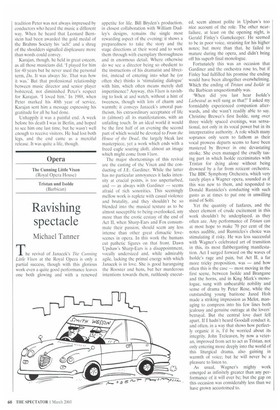Opera
The Cunning Little Vixen (Royal Opera House) Tristan und Isolde (Barbican)
Ravishing spectacle
Michael Tanner
The revival of Janacek's The Cunning Little Vixen at the Royal Opera is only a partial success, though with this glorious work even a quite good performance leaves one both glowing and with a renewed
appetite for life. Bill Bryden's production. in closest collaboration with William Dudley's designs, remains the single most rewarding aspect of the evening: it shows a preparedness to take the story and the stage directions at their word and to work them through with exemplary thoroughness and in enormous detail. Where otherwise do we see a director being so obedient to the instructions of his dramatist and librettist, instead of entering into what he (or often she) thinks is 'stimulating dialogue' with him, which often means merely dull impertinence? Anyway. this Vixen is ravishing to look at and watch, without a hint of tweeness, though with lots of charm and warmth: it conveys Janacek's amoral pantheism, his extraordinary acceptance of life in (almost) all its manifestations, with an unfailing touch. In an ideal world it would be the first half of an evening the second part of which would be devoted to From the House of the Dead, the largely bleak last masterpiece, yet a work which ends with a freed eagle soaring aloft, almost an image which might come from Vixen.
The major shortcomings of this revival are the casting of the Vixen and the conducting of J.E. Gardiner. While the latter has no particular annoyances it lacks intensity at crucial points, is too unperturbed, and — as always with Gardiner — seems afraid of rich sonorities. This seemingly mellow work is replete with casual violence and brutality, and they shouldn't be so blended into the musical texture as to be almost susceptible to being overlooked, any more than the erotic ecstasy of the end of Act II, when Sharp-Ears and Fox consummate their passion, should seem any less intense than other great climactic lovescenes in opera. In this work the humans cut pathetic figures on that front. Dawn Upshaw's Sharp-Ears is a disappointment, vocally undersized and, while admirably agile, lacking the primal energy with which Janacek is in love. She is good haranguing the Rooster and hens, but her murderous intentions towards them, ruthlessly execut
ed, seem almost polite in Upshaw's too nice account of the role. The other nearfailure, at least on the opening night, is Gerald Finley's Gamekeeper. He seemed to be in poor voice, straining for his higher notes; but more than that, he failed to mature during the opera, and didn't bring off his superb final monologue.
Fortunately this was an occasion that Gardiner and the orchestra rose to, but if Finley had fulfilled his promise the ending would have been altogether overwhelming. Which the ending of Tristan und Isolde at the Barbican unquestionably was.
'When did you last hear Isolde's Liebestod as well sung as that?' I asked my formidably experienced companion afterwards, and she wasn't readily able to say. Christine Brewer's first Isolde, sung over three widely spaced evenings, was sensational, not only in its vocal power but in its interpretative authority. A role which many sopranos only seem to fathom as their vocal prowess departs seems to have been mastered by Brewer in one devastating stroke. She even managed the cruelly taxing part in which Isolde recriminates with Tristan for dying alone without being drowned by a far from reticent orchestra. The BBC Symphony Orchestra, which very rarely plays a Wagner opera, sounded as if this was new to them, and responded to Donald Runnicles's conducting with such gusto as at times to put one in unwilling mind of Solti.
Yet the quantity of fanfares, and the sheer element of crude excitement in this work shouldn't be underplayed, as they often are. Any performance of Tristan can at most hope to make 70 per cent of the notes audible, and Runnicles's choice was stimulating if risky. He was less successful with Wagner's celebrated art of transition in this, its most flabbergasting manifestation. Act I surged forward on the waves of Iso!de's rage and pain, but Act II, a far more tricky proposition. was — and how often this is the case — most moving in the first scene, between Isolde and Brangane and the horns, and in King Mark's monologue, sung with unbearable nobility and sense of drama by Peter Rose, while the outstanding young baritone Jared Holt made a striking impression as Melot, managing to compress into his few lines both jealousy and genuine outrage at the lovers' betrayal. But the central love duet fell apart. If I hadn't heard Goodall conduct it, and often, in a way that shows how perfectly organic it is, I'd be worried about its integrity. John Treleaven, by now a veteran, improved from act to act as Tristan, not only entering more deeply into the world of this liturgical drama, also gaining in warmth of voice; but he will never be a pleasure to listen to.
As usual, Wagner's mighty work emerged as infinitely greater than any performance of it will ever be; but the gap on this occasion was considerably less than we have grown accustomed to.


















































































 Previous page
Previous page